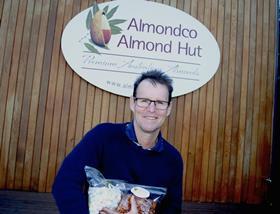
Australia’s almond industry is poised to capitalise on heightened global demand for healthy, long life food products in the wake of the coronavirus (Covid-19) pandemic.
Growers have been buoyed by ideal weather conditions, strong sales enquiriesand the use of machine harvesting, which has minimised disruptions caused by social distancing requirements.
Leading South Australian nut producerAlmondcois in the midst of its seasonal harvest, which started in February. Tim Jackson, Almondco’s group sales and marketing manager, said last year was a record harvest in Australia and this season appeared to be matching figures of about 100,000 tonnes.
“The quality has really stood up, unfortunately drought conditions aren’t good for many other crops but dry weather across the summer is ideal for our industry with less disease and insect pressures,” Jackson said.
Almondco exports 60 per cent of its product, with China among its key markets. Demand from the Asian nation has been growing as a result of the China-US trade war, which has had an impact on shipments from California, the world’s largest almond growing region.
Jackson said China was beginning to lift restrictions associated with Covid-19, and despite uncertainty about ships and container availability, the export outlook was positive for Australian almonds.
It was unclear, at this stage, how the Australian almond industry would traverse its other more traditional export markets in Europe and India, with India this week extending its lockdown period.
“We are fortunate we have a shelf stable product, we will be doing our best to sell our whole crop this year but we don’t have as much time pressure as some other products,” Jackson explained.
“We are also fortunate to have such a healthy product with such a good name for what it provides, people who can afford it are looking for shelf stable products to buy and with healthy benefits.”
Jackson said sales in the Australian domestic market were strong, with supermarkets reporting huge demand for longer shelf life almonds and products like almond milk, as shoppers turn to home cooking during isolation.
More than 80 per cent of Australia’s almond growers supply product to Almondco, making it one of the most successful horticultural co-operatives in the nation. It has grown to become the second largest processor of almonds in Australia.
Its processing facility at Renmark in South Australia’s Riverland handled over 27,000 tonnes of almonds last year. The co-operative also has a hulling and shelling facility at Lyrup, also in the Riverland, and one across the South Australian border in the New South Wales Riverina.
Almondco has begun work on a new A$28.5m processing facility in Renmark. Plans include a new specialised sorting room with advanced electronic sorting equipment to double brown kernel processing, along with full utilisation and treatment of the site’s wastewater. Once complete, the expansion will see Almondco processing more than 45,000 tonnes of almonds per year by 2026.
Jackson said concerns in other horticulture industries about a shortage of orchard workers, linked to new guidelines introduced for Covid-19, have not impacted the almond industry. Crops in South Australia are being harvested using machine tree shaking and machine collection.
This article is based on a Creative Commons story written and published byBelinda Willis for theThe Lead South Australia.



